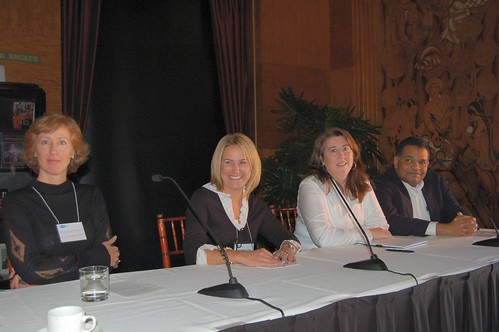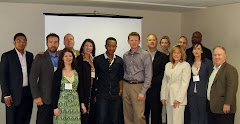
What does it take to be a better CMO? Four CMOs sat down to discuss leadership and career management issues for CMOs. On the panel (from left to right) were:
Here's a summary of advice from the panel and the audience of CMOs:
- Menon - Make marketing an attractive place to work. I start by trying to hire people that are smarter than me. Rotate people so they have a global perspective of the business. Give them the same kind of perspective you have. Reward your best people excessively and have it skewed.
- Hanrahan - 60% of your employees don't talk about their goals outside of their performance review. 65% don't think their goals are tied to the company goals. What does it matter how I perform if it doesn't count in my review, employees think. And 60% of employees don't think their feedback is taken into consideration in their review.
- Hanrahan - Millenials are expecting feedback every single day. They grew up working in a team environment. You have to have goals that a team can embrace and they need to see it.
- Celebrate personal moments in your employees' lives and even ask what people's "happiness" index is (personal and professional).
- Hanrahan - One of the reasons people stay at a job is because they have a best friend at work.
- Ripley-Boyd - You don't want to educate on marketing theory, you want to tap into the business aspirations of the CEO and President. Develop a CEO-like obsession with the bottom line. Contributing to things outside of the marketing sphere and help out and show consideration to the CMO.
- Weesner - Be a marketing person that can actually talk about the business.
- Menon - Get to know your product. For example, if you're at a software company, you should be able to demo your product. Go out on a sales call and know what the story is being told out in the field. Manage upward to the board and get into the board meeting. Do all those things that you don't think are your job. That's how you can be both the cheerleader and chief. All those little things add up.
- Menon - Go for the emotional play. Sure you've got a few spreadsheets that say one thing, but tell some actual stories that paint a bigger picture.
- Ask your different groups, "What does marketing mean to your part of the company?" You'll be amazed with the answers you get. Unite this information and then communicate back to the corporation that marketing means something different to everyone.
- Hanrahan - Marketing is often seen as a staff function rather than a revenue function. Define your role and the communicate it.
- Weesner - The more we understand the details of our customers and the ability to align them with the company's goals, you'll be able to make better decisions for the marketing department.
Check out
all coverage at The CMO Club Peer to Peer Summit.
 What does it take to be a better CMO? Four CMOs sat down to discuss leadership and career management issues for CMOs. On the panel (from left to right) were:
What does it take to be a better CMO? Four CMOs sat down to discuss leadership and career management issues for CMOs. On the panel (from left to right) were:






No comments:
Post a Comment